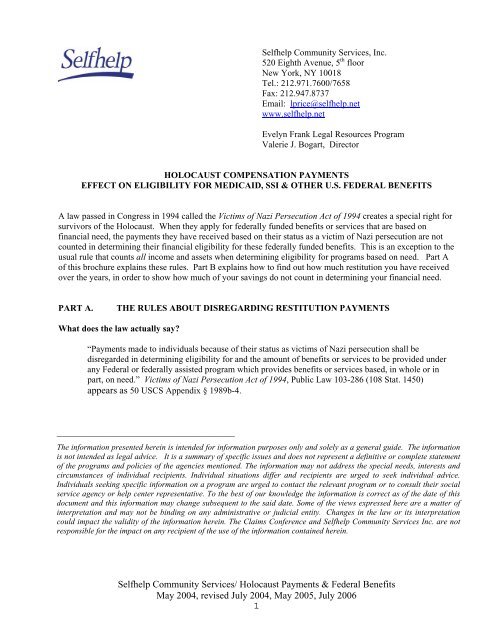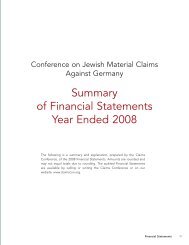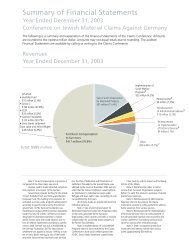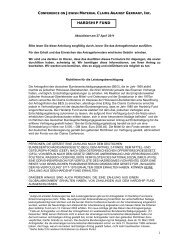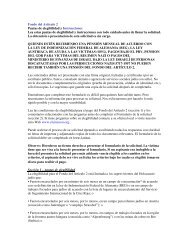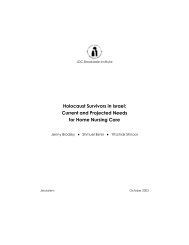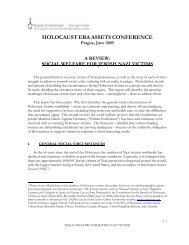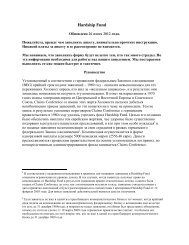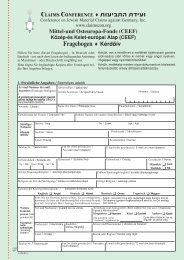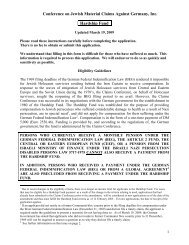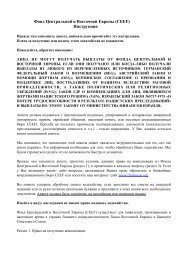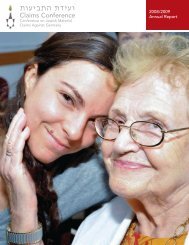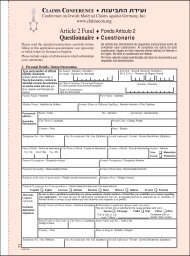Selfhelp Community Services - Conference on Jewish Material ...
Selfhelp Community Services - Conference on Jewish Material ...
Selfhelp Community Services - Conference on Jewish Material ...
Create successful ePaper yourself
Turn your PDF publications into a flip-book with our unique Google optimized e-Paper software.
<str<strong>on</strong>g>Selfhelp</str<strong>on</strong>g> <str<strong>on</strong>g>Community</str<strong>on</strong>g> <str<strong>on</strong>g>Services</str<strong>on</strong>g>, Inc.<br />
520 Eighth Avenue, 5 th floor<br />
New York, NY 10018<br />
Tel.: 212.971.7600/7658<br />
Fax: 212.947.8737<br />
Email: lprice@selfhelp.net<br />
www.selfhelp.net<br />
Evelyn Frank Legal Resources Program<br />
Valerie J. Bogart, Director<br />
HOLOCAUST COMPENSATION PAYMENTS<br />
EFFECT ON ELIGIBILITY FOR MEDICAID, SSI & OTHER U.S. FEDERAL BENEFITS<br />
A law passed in C<strong>on</strong>gress in 1994 called the Victims of Nazi Persecuti<strong>on</strong> Act of 1994 creates a special right for<br />
survivors of the Holocaust. When they apply for federally funded benefits or services that are based <strong>on</strong><br />
financial need, the payments they have received based <strong>on</strong> their status as a victim of Nazi persecuti<strong>on</strong> are not<br />
counted in determining their financial eligibility for these federally funded benefits. This is an excepti<strong>on</strong> to the<br />
usual rule that counts all income and assets when determining eligibility for programs based <strong>on</strong> need. Part A<br />
of this brochure explains these rules. Part B explains how to find out how much restituti<strong>on</strong> you have received<br />
over the years, in order to show how much of your savings do not count in determining your financial need.<br />
PART A. THE RULES ABOUT DISREGARDING RESTITUTION PAYMENTS<br />
What does the law actually say?<br />
“Payments made to individuals because of their status as victims of Nazi persecuti<strong>on</strong> shall be<br />
disregarded in determining eligibility for and the amount of benefits or services to be provided under<br />
any Federal or federally assisted program which provides benefits or services based, in whole or in<br />
part, <strong>on</strong> need.” Victims of Nazi Persecuti<strong>on</strong> Act of 1994, Public Law 103-286 (108 Stat. 1450)<br />
appears as 50 USCS Appendix § 1989b-4.<br />
____________________________________________<br />
The informati<strong>on</strong> presented herein is intended for informati<strong>on</strong> purposes <strong>on</strong>ly and solely as a general guide. The informati<strong>on</strong><br />
is not intended as legal advice. It is a summary of specific issues and does not represent a definitive or complete statement<br />
of the programs and policies of the agencies menti<strong>on</strong>ed. The informati<strong>on</strong> may not address the special needs, interests and<br />
circumstances of individual recipients. Individual situati<strong>on</strong>s differ and recipients are urged to seek individual advice.<br />
Individuals seeking specific informati<strong>on</strong> <strong>on</strong> a program are urged to c<strong>on</strong>tact the relevant program or to c<strong>on</strong>sult their social<br />
service agency or help center representative. To the best of our knowledge the informati<strong>on</strong> is correct as of the date of this<br />
document and this informati<strong>on</strong> may change subsequent to the said date. Some of the views expressed here are a matter of<br />
interpretati<strong>on</strong> and may not be binding <strong>on</strong> any administrative or judicial entity. Changes in the law or its interpretati<strong>on</strong><br />
could impact the validity of the informati<strong>on</strong> herein. The Claims <str<strong>on</strong>g>C<strong>on</strong>ference</str<strong>on</strong>g> and <str<strong>on</strong>g>Selfhelp</str<strong>on</strong>g> <str<strong>on</strong>g>Community</str<strong>on</strong>g> <str<strong>on</strong>g>Services</str<strong>on</strong>g> Inc. are not<br />
resp<strong>on</strong>sible for the impact <strong>on</strong> any recipient of the use of the informati<strong>on</strong> c<strong>on</strong>tained herein.<br />
<str<strong>on</strong>g>Selfhelp</str<strong>on</strong>g> <str<strong>on</strong>g>Community</str<strong>on</strong>g> <str<strong>on</strong>g>Services</str<strong>on</strong>g>/ Holocaust Payments & Federal Benefits<br />
May 2004, revised July 2004, May 2005, July 2006<br />
1
What are the “federally funded” programs that do not count restituti<strong>on</strong> payments when they determine<br />
financial eligibility?<br />
The exempti<strong>on</strong> applies to any benefits or services provided by a program for which eligibility is based, in<br />
whole or part, <strong>on</strong> financial need, IF:<br />
o The program is operated by the federal government, or<br />
o The program is operated by local governments or private organizati<strong>on</strong>s, but receives funding from the<br />
federal government<br />
These programs include, but are not limited to the following:<br />
o Medical Assistance Programs (known as Medicaid, Medi-Cal)<br />
o Supplemental Security Income (SSI)<br />
o Food Stamps<br />
o Federally subsidized Housing programs -- public housing, Secti<strong>on</strong> 8, Secti<strong>on</strong> 202<br />
o Home Energy Assistance Program (HEAP)<br />
o Weatherizati<strong>on</strong> Referral and Packaging Program (WRAP)(provides low-income elderly with free<br />
home energy services designed to lower their energy bills)<br />
o Access-a-Ride – or other para-transit programs for pers<strong>on</strong>s with disabilities<br />
o Emergency Assistance for Adults (EAA) (grants to SSI recipients to prevent evicti<strong>on</strong> and utility shutoffs)<br />
o Medicare Savings Programs (QMB, SLIMB, QI-1)(pays Medicare Part B premium and sometimes<br />
other Medicare co-insurance)<br />
o Meals <strong>on</strong> Wheels<br />
o Veteran’s pensi<strong>on</strong>s based <strong>on</strong> need<br />
o Temporary Assistance for Needy Families (TANF)(cash assistance for adults taking care of children or<br />
grandchildren, if adult not eligible for SSI)<br />
What about programs funded <strong>on</strong>ly by my state, with no federal m<strong>on</strong>ey? Are my reparati<strong>on</strong>s exempt for<br />
these programs?<br />
The federal law applies <strong>on</strong>ly to federally-funded programs. Your state legislature may have enacted its own<br />
law that excludes reparati<strong>on</strong>s. You will need to check with your state agencies or with an organizati<strong>on</strong> that<br />
assists Nazi victims to find out which of your state’s programs do not count reparati<strong>on</strong>s.<br />
In New York:, the following programs expressly exempt “… payments made to individuals because of their<br />
status as victims of Nazi persecuti<strong>on</strong>, as defined in P.L. 103-286….” or the federal Victims of Nazi Persecuti<strong>on</strong><br />
Act of 1994, discussed above.<br />
1. Senior Citizens & Disability Rent Increase Exempti<strong>on</strong>s (SCRIE and DRIE) -- N. Y. Real Property<br />
Tax Law § 467-b(1)(c);<br />
2. Real Property Tax Circuit Breaker Credit -- NYS Tax Law § 606(e)(1)(C);<br />
3. EPIC (prescripti<strong>on</strong> drugs for people 65+) -- N. Y. Elder Law § 241(3)<br />
4. Any program provided under the authority of the Social <str<strong>on</strong>g>Services</str<strong>on</strong>g> Law. SSL § 1, 131-n. Apart from<br />
programs exempt under federal law described above, this includes, for example:<br />
a. Safety net assistance (formerly known as “Home Relief”) and Safety Net Medicaid<br />
b. Homeless housing and assistance<br />
c. Family Health Plus<br />
<str<strong>on</strong>g>Selfhelp</str<strong>on</strong>g> <str<strong>on</strong>g>Community</str<strong>on</strong>g> <str<strong>on</strong>g>Services</str<strong>on</strong>g>/ Holocaust Payments & Federal Benefits<br />
May 2004, revised July 2004, May 2005, July 2006<br />
2
Which payments are exempt (i.e., are not counted)?<br />
Payments made to individuals because of their status as victims of Nazi persecuti<strong>on</strong> are exempt (are not<br />
counted). A victim of Nazi persecuti<strong>on</strong> may be a pers<strong>on</strong> who lived in, or fled from, a country that was under<br />
Nazi rule, Nazi occupati<strong>on</strong> or the direct influence or c<strong>on</strong>trol of the Nazis. As l<strong>on</strong>g as being a Nazi victim is <strong>on</strong>e<br />
of the reas<strong>on</strong>s for the payment to this individual, the payment qualifies for this exempti<strong>on</strong>.<br />
Payments that are exempt generally include any payments listed at this link:<br />
http://www.claimsc<strong>on</strong>.org/index.asp?url=compensati<strong>on</strong>_guide .<br />
If you do not have access to the internet and wish to know if the payments you have received or c<strong>on</strong>tinue to<br />
receive are exempt, please c<strong>on</strong>tact your local Social Service Agency, Help Center Representative or the Claims<br />
<str<strong>on</strong>g>C<strong>on</strong>ference</str<strong>on</strong>g> Department of <str<strong>on</strong>g>Services</str<strong>on</strong>g>, 1359 Broadway, room 2020, New York, New York 10018<br />
Tel: 646-536-9100; Fax: 212-685-5299; Email: info@claimsc<strong>on</strong>.org.<br />
Some payments require special proof that they qualify for the exempti<strong>on</strong>, in other words, that they should not<br />
be counted. For example, under the Supplemental Security Income (SSI) program (and also under the<br />
Medicaid program, which usually follows SSI rules), <strong>on</strong>ly certain Austrian Social Insurance Payments are<br />
exempt. Payments which were based, in whole or in part, <strong>on</strong> wage credits granted under Paragraphs 500-506<br />
of the Austrian General Social Insurance Act are exempt. These paragraphs grant credits to individuals who<br />
suffered a loss (i.e., were impris<strong>on</strong>ed, unemployed, or forced to flee Austria) during the period of March 1933<br />
to May 1945 for political, religious, or ethnic reas<strong>on</strong>s. Not all Austrian social insurance payments are based <strong>on</strong><br />
Paragraphs 500-506. You can tell if your Austrian pensi<strong>on</strong> is exempt by looking at the original award notice.<br />
Some notices c<strong>on</strong>tain informati<strong>on</strong> about wage credits granted under Paragraphs 500-506 of the Austrian<br />
General Social Insurance Act. The notices are written in German, and anywhere in the notice, the following<br />
language may appear:<br />
DIE BEGUENSTIGUNGSVORSCHRIFTEN FUER GESCHAEDIGTE AUS POLITISCHEN ODER<br />
RELIGIOESEN GRUENDEN ODER AUS GRUENDEN DER ABSTAMMUNG WURDEN<br />
ANGEWENDET ( §500FF ASVG);<br />
TRANSLATION: “The regulati<strong>on</strong>s which give preferential treatment for pers<strong>on</strong>s who suffered because of<br />
political or religious reas<strong>on</strong>s or reas<strong>on</strong>s of origin were applied (§500ff ASVG) see<br />
http://policy.ssa.gov/poms.nsf/lnx/0500830715<br />
If you d<strong>on</strong>’t have your original award notice, you can obtain a copy by writing to:<br />
Pensi<strong>on</strong>sversicherungsanstalt, Friedrich-Hillegeist-Str 1, A-1021 Vienna, Austria, Tel.: 43-503-03; Fax: 43-<br />
503-03-288-50; Email: pva@pva.sozvers.at; Website: www.sozvers.at. For general informati<strong>on</strong> <strong>on</strong> Austrian<br />
Social Security <strong>on</strong>line: http://www.ikg-wien.at/restituti<strong>on</strong><br />
Must the payment be received from a European government or the Claims <str<strong>on</strong>g>C<strong>on</strong>ference</str<strong>on</strong>g> to be exempt?<br />
No. The federal law does not specify that the grant must be given by a European government or by the<br />
Claims <str<strong>on</strong>g>C<strong>on</strong>ference</str<strong>on</strong>g>. Therefore, a grant from a n<strong>on</strong>-profit organizati<strong>on</strong> that is based <strong>on</strong> an individual’s status<br />
as a Nazi victim is exempt. For example, The Blue Card, Inc. at http://bluecard.org/ is a n<strong>on</strong>-profit private<br />
organizati<strong>on</strong> that gives grants to needy survivors. These payments are exempt when given to an individual<br />
because of his or her status as a victim of Nazi persecuti<strong>on</strong>. Similarly, payment by a private corporati<strong>on</strong> as a<br />
result of a lawsuit brought for compensati<strong>on</strong> for property stolen during the Nazi occupati<strong>on</strong> would be exempt.<br />
<str<strong>on</strong>g>Selfhelp</str<strong>on</strong>g> <str<strong>on</strong>g>Community</str<strong>on</strong>g> <str<strong>on</strong>g>Services</str<strong>on</strong>g>/ Holocaust Payments & Federal Benefits<br />
May 2004, revised July 2004, May 2005, July 2006<br />
3
What does it mean that restituti<strong>on</strong> payments are “exempt” from being counted for my eligibility for a<br />
federally funded program?<br />
Most programs that are based <strong>on</strong> financial need look at two different factors -- “income” and “resources” that<br />
are discussed in detail below. If the applicant is married, the income and resources of the spouse are generally<br />
counted as well. Programs vary about whether they count income and resources of other pers<strong>on</strong>s in the same<br />
household, such as children or extended family.<br />
1. “Income” is usually defined as any payment received by the individual, and sometimes by his<br />
or her spouse or family. Income may be a payment that is recurring (such as Social Security), or a <strong>on</strong>e-time<br />
payment (such as a lawsuit settlement). The payment may be from earnings from work, or “unearned” income<br />
such as a pensi<strong>on</strong>, Social Security, or interest from a bank account. All programs based <strong>on</strong> financial need set a<br />
limit <strong>on</strong> the amount of income you (and usually your spouse) may receive to be eligible for the program.<br />
A payment from any of the restituti<strong>on</strong> programs or lawsuits would normally be c<strong>on</strong>sidered “income” in the<br />
m<strong>on</strong>th you receive it. Because of the special exempti<strong>on</strong>, however, restituti<strong>on</strong> payments received by you or<br />
your spouse are not counted as “income” in the m<strong>on</strong>th you receive it.<br />
EXAMPLE: In your state, the limit <strong>on</strong> m<strong>on</strong>thly income a single pers<strong>on</strong> may have to be eligible for<br />
Medicaid is $650 each m<strong>on</strong>th. Your Social Security is $650 each m<strong>on</strong>th. You also receive a BEG<br />
payment (“Wiedergutmachung”) from the German government each m<strong>on</strong>th of $300. You are eligible<br />
for Medicaid because the BEG payment is “exempt” or disregarded from your countable income.<br />
Your Social Security is counted but is within the allowed m<strong>on</strong>thly limit of $650. You are eligible,<br />
assuming your resources or assets are within the permitted limits. See next secti<strong>on</strong>.<br />
2. “Resources” are property you own, including cash, savings, stocks, b<strong>on</strong>ds, IRAs, pensi<strong>on</strong>s, your<br />
home or other real property, etc. If you do not spend all of your income received in <strong>on</strong>e m<strong>on</strong>th, the unspent<br />
amount becomes a “resource” in the following m<strong>on</strong>th, added to savings that you already had.<br />
Every federally assisted program based <strong>on</strong> need sets different limits <strong>on</strong> the types and amount of resources or<br />
assets you may have and still be eligible for the program. Every federal program has different rules for<br />
determining which of these assets are counted, and which are excluded. However, they all have <strong>on</strong>e thing in<br />
comm<strong>on</strong> - they all exempt assets that are composed of restituti<strong>on</strong> payments you have received in the past.<br />
EXAMPLE: You have received BEG (“Wiedergutmachung”) checks from the German government<br />
for thirty years, and the total amount of all these checks has been $100,000. (To find out how much<br />
you have received over the years, see below). You have a savings account with a total balance of<br />
$100,000. Since this is the same amount that you have received in restituti<strong>on</strong>, this entire account is<br />
exempt and disregarded from your countable assets. Your other assets c<strong>on</strong>sist solely of a separate<br />
bank account with $3000. If your state’s Medicaid program has an asset limit of $3000, you should be<br />
eligible for Medicaid even with the $100,000 account.<br />
My saved restituti<strong>on</strong> payments have earned interest or dividends -- is the interest and dividends also<br />
disregarded?<br />
The answer depends <strong>on</strong> whether we are discussing interest accrued in the past, before you ever applied for<br />
Medicaid or SSI, or whether the interest is earned currently, after you have applied for Medicaid or SSI. We<br />
will discuss these issues separately.<br />
<str<strong>on</strong>g>Selfhelp</str<strong>on</strong>g> <str<strong>on</strong>g>Community</str<strong>on</strong>g> <str<strong>on</strong>g>Services</str<strong>on</strong>g>/ Holocaust Payments & Federal Benefits<br />
May 2004, revised July 2004, May 2005, July 2006<br />
4
1. Interest earned before you applied for Medicaid or SSI<br />
Let’s say you have saved your restituti<strong>on</strong> payments in an account that has earned interest, and you have never<br />
withdrawn any m<strong>on</strong>ey from the account. You now want to apply for Medicaid, SSI or another federally<br />
funded program. If the total balance of the restituti<strong>on</strong> account, with interest, is below the total amount in<br />
restituti<strong>on</strong> you received over the years, the entire account is exempt or disregarded.<br />
EXAMPLE 1 You received $100,000 in restituti<strong>on</strong> since the 1960’s, but did not save it all. Your<br />
restituti<strong>on</strong> account now with interest has a balance of $80,000. Even though some of this account is<br />
from interest, the total account is exempt. You do not have to withdraw any interest accrued.<br />
EXAMPLE 2 You received $100,000 in restituti<strong>on</strong> and saved it all, so that now, with interest, the<br />
restituti<strong>on</strong> account has $150,000. You must withdraw $50,000 from the account, so that the amount<br />
remaining in the restituti<strong>on</strong> account is the total actual amount of restituti<strong>on</strong> payments you received -<br />
$100,000. In other words, you will have to withdraw all interest earned <strong>on</strong> the account over the years.<br />
To learn how to determine the amount of restituti<strong>on</strong> you received over the years, see Part B below.<br />
CAUTION: In the sec<strong>on</strong>d example above, when you withdraw interest <strong>on</strong> your reparati<strong>on</strong>s payments, or<br />
separate your reparati<strong>on</strong>s from your other savings, you may find that you have a c<strong>on</strong>siderable amount of<br />
savings that are NOT exempt. For example, you may have received $100,000 in reparati<strong>on</strong>s over the years,<br />
but your savings are $150,000. You will not be eligible for most federal programs based <strong>on</strong> need if you have<br />
substantial n<strong>on</strong>-exempt savings. Each program has different rules about whether you are allowed to transfer<br />
the excess resources to a family member, friend, or trust in order to qualify for the program. These rules are<br />
complicated. You should c<strong>on</strong>sult an elder law attorney or other professi<strong>on</strong>al with expertise in the program<br />
you are interested in to learn these rules and how they apply to you.<br />
2. Is new interest earned counted as income or a resource?<br />
Federal programs vary as to whether or not they count as “income” the interest earned <strong>on</strong> saved reparati<strong>on</strong><br />
payments. In July 2004, a significant change occurred for the SSI program, which also affects Medicaid.<br />
Prior to July 1, 2004, interest earned <strong>on</strong> unspent payments to victims of Nazi persecuti<strong>on</strong> was not excluded as<br />
income for SSI. For SSI benefits payable <strong>on</strong> or after July 1, 2004, interest earned <strong>on</strong> unspent payments to<br />
victims of Nazi persecuti<strong>on</strong> is excluded from income. See Social Security Administrati<strong>on</strong> Program Operati<strong>on</strong>s<br />
Manual System (POMS) secti<strong>on</strong> SI 00830.710 at http://policy.ssa.gov/poms.nsf/lnx/0500830710 and SI<br />
00830.500C. These rules implement secti<strong>on</strong> 430 of the Social Security Protecti<strong>on</strong> Act of 2004, Public Law<br />
108-203 [H.R. 743], signed Mar. 02, 2004, amending 42 U.S.C. § 1382a(b)(21) - (23). Since Medicaid rules<br />
may not be stricter than SSI rules, these new SSI rules help Medicaid recipients too. After July 1, 2004,<br />
interest <strong>on</strong> reparati<strong>on</strong>s accounts may no l<strong>on</strong>ger be counted as income by any Medicaid programs in the U.S.<br />
CAUTION: Though interest earned <strong>on</strong> saved reparati<strong>on</strong>s does not count as “income” for SSI and Medicaid,<br />
if the interest is saved bey<strong>on</strong>d the m<strong>on</strong>th it is earned, then it counts as a “resource.” (See explanati<strong>on</strong> of the<br />
difference between “income” and “resources” above at pp. 3-4).<br />
EXAMPLE: You have saved $60,000 in restituti<strong>on</strong> payments. That amount is now in a savings account<br />
earning 2.0 percent interest, or $1200 per year or $100 per m<strong>on</strong>th.<br />
INCOME: Beginning July 1, 2004, the $100 earned each m<strong>on</strong>th does not count as income. For<br />
an SSI recipient, this means that your m<strong>on</strong>thly SSI check will not be reduced because you receive this<br />
<str<strong>on</strong>g>Selfhelp</str<strong>on</strong>g> <str<strong>on</strong>g>Community</str<strong>on</strong>g> <str<strong>on</strong>g>Services</str<strong>on</strong>g>/ Holocaust Payments & Federal Benefits<br />
May 2004, revised July 2004, May 2005, July 2006<br />
5
income. For a Medicaid recipient, this means that the $100/m<strong>on</strong>th will not be counted as income, so<br />
will not increase your “excess income” or m<strong>on</strong>thly spend-down amount.<br />
RESOURCES: Let’s assume that you let the $100 earned each m<strong>on</strong>th stay in the restituti<strong>on</strong> account<br />
after the m<strong>on</strong>th in which is received. The balance of the account increases gradually, even without<br />
adding more restituti<strong>on</strong>. While the original $60,000 of reparati<strong>on</strong>s does not count as a “resource,” the<br />
added interest now becomes a “resource” and is countable toward the resource limit of your federal<br />
program. For SSI, for example, the resource limit for a single pers<strong>on</strong> is $2000. If you receive SSI,<br />
and if you have a separate regular savings account, the amount in your regular savings account PLUS<br />
the amount of interest earned <strong>on</strong> your restituti<strong>on</strong> may not exceed $2000. (In the New York Medicaid<br />
program, the resource limit for a single individual in 2004 is $3950.).<br />
Do you have to withdraw the interest earned each m<strong>on</strong>th from the restituti<strong>on</strong> account, so it does not<br />
become a “resource”? Under SSI rules, you should not be required to withdraw the interest or keep<br />
it separately from the reparati<strong>on</strong>s. This asserti<strong>on</strong> is based <strong>on</strong> a provisi<strong>on</strong> in the Social Security Manual<br />
(called the POMS) that says, “Identifiability does not require that excluded funds be kept physically<br />
apart from other funds (e.g., in a separate bank account).” SSA POMS SI 01130.700. See link at n 1<br />
below. However, the interest you save after the m<strong>on</strong>th it is earned becomes part of your countable<br />
n<strong>on</strong>-exempt savings. You should keep track of the interest and make sure that the amount of total<br />
interest earned, when added to your other countable savings accounts, does not exceed the resource<br />
limit for your program. You may need to withdraw and spend some of the interest <strong>on</strong> the reparati<strong>on</strong>s<br />
from time to time, to keep your total countable savings under the allowable limits for the program.<br />
Do I have to keep the restituti<strong>on</strong> in a separate account in order to have it disregarded?<br />
The rules for each federal program may be different, but most require that the restituti<strong>on</strong> payments be<br />
“identifiable” from your other assets. The regulati<strong>on</strong>s for SSI, for example, state:<br />
“In order for . . . [restituti<strong>on</strong> payments] to be excluded from resources, such funds must be segregated<br />
and not commingled with other countable resources so that the excludable funds are identifiable.”<br />
20 CFR §416.1236(a)(18) and (b) at http://www.ssa.gov/OP_Home/cfr20/416/416-1236.htm. The SSI rules<br />
generally apply to Medicaid. The exact meaning of this rule is open to interpretati<strong>on</strong>. One view is that a<br />
separate restituti<strong>on</strong> account is not required, as l<strong>on</strong>g as you can identify the porti<strong>on</strong> of your account that was<br />
deposited from restituti<strong>on</strong> payments. 1 However, it is recommended that you keep restituti<strong>on</strong> payments in a<br />
separate account (or accounts) in which you do not deposit funds from any other source. Your restituti<strong>on</strong><br />
payments may be in any type of account, such as a savings account, CD, stocks, or b<strong>on</strong>ds. You may have<br />
more than <strong>on</strong>e restituti<strong>on</strong> account, such as both a savings account and a CD. What matters is that these<br />
accounts do not c<strong>on</strong>tain funds from other sources of income -- Social Security, work earnings, etc. Also, keep<br />
in mind that interest generated by the account is not exempt. See above<br />
1 Support for this view is in the Social Security POMS Manual secti<strong>on</strong> SI 01130.700 which states,<br />
“Identifiability does not require that excluded funds be kept physically apart from other funds (e.g., in a<br />
separate bank account).” http://policy.ssa.gov/poms.nsf/lnx/0501130700<br />
<str<strong>on</strong>g>Selfhelp</str<strong>on</strong>g> <str<strong>on</strong>g>Community</str<strong>on</strong>g> <str<strong>on</strong>g>Services</str<strong>on</strong>g>/ Holocaust Payments & Federal Benefits<br />
May 2004, revised July 2004, May 2005, July 2006<br />
6
What if I have always combined my savings from restituti<strong>on</strong> payments in the same bank account, CD, or<br />
stocks al<strong>on</strong>g with my other savings, and did not keep it in a separate account?<br />
It is alright if your savings from restituti<strong>on</strong> were combined with your other savings in the past. However, if<br />
you now want to apply for a federally assisted benefit, you must now put your savings from restituti<strong>on</strong><br />
payments into a separate account or accounts. Of course you can never know which dollars in your savings<br />
account were from restituti<strong>on</strong>, and which you saved from your job or business. The important thing is that you<br />
figure out the total amount you received in restituti<strong>on</strong> over the years, and put that amount into a separate<br />
“restituti<strong>on</strong>” account or accounts – a CD, bank account, etc. See below for how to figure out that total amount.<br />
Do I need to set up a “Restituti<strong>on</strong> Trust” to hold my restituti<strong>on</strong> payments?<br />
No. As l<strong>on</strong>g as your restituti<strong>on</strong> payments are in identifiable accounts, separate from your other savings and<br />
income, you do not have to put your restituti<strong>on</strong> savings into a trust fund in order to ensure that they are exempt<br />
from being counted for eligibility for Medicaid, SSI and other federal benefits based <strong>on</strong> need. Trust funds,<br />
including restituti<strong>on</strong> trusts, are estate planning tools that may have other benefits for you. You might decide to<br />
set up a trust for reas<strong>on</strong>s other than qualifying for federal benefits. You should c<strong>on</strong>sult an experienced elder<br />
law attorney about whether a trust may be beneficial for you. C<strong>on</strong>sult the Nati<strong>on</strong>al Academy of Elder Law<br />
Attorneys (Nati<strong>on</strong>al Academy of Elder Law Attorneys, Inc., 1604 North Country Club Rd, Tucs<strong>on</strong>, Ariz<strong>on</strong>a<br />
85716 - 520/881-4005 fax 520/325-7925; www.naela.org) for referrals. However, you do not have to set up a<br />
trust to qualify for Medicaid or other federally assisted programs, without being required to spend your saved<br />
reparati<strong>on</strong>s payments.<br />
Can Medicaid take restituti<strong>on</strong> funds left in my Estate after I die?<br />
Generally, local Medicaid agencies must make claims against the Estates of Medicaid recipients after they die<br />
for the cost of Medicaid services that were provided after the age of 55. However, the State Medicaid Manual<br />
published by the federal Center for Medicare and Medicaid <str<strong>on</strong>g>Services</str<strong>on</strong>g> (CMS) states, "Government reparati<strong>on</strong><br />
payments to special populati<strong>on</strong>s are exempt from estate recovery." Sec. 3810.A.8.<br />
http://www.cms.hhs.gov/manuals/pub45pdf/sm3800.pdf (page 3-9-6). In 2002, New York State clarified<br />
that the government will not pursue any recovery of government reparati<strong>on</strong>s payments from the estates of<br />
Medicaid recipients after they die. NYS Dep’t of Health, “Medicaid Liens and Recoveries,” Administrative<br />
Directive No. 02 OMM/ADM-3 p. 10. <br />
In states other than New York, the federal manual should bar any Estate recovery from reparati<strong>on</strong>s.<br />
<str<strong>on</strong>g>Selfhelp</str<strong>on</strong>g> <str<strong>on</strong>g>Community</str<strong>on</strong>g> <str<strong>on</strong>g>Services</str<strong>on</strong>g>/ Holocaust Payments & Federal Benefits<br />
May 2004, revised July 2004, May 2005, July 2006<br />
7
PART B HOW TO FIND OUT HOW MUCH RESTITUTION YOU HAVE RECEIVED<br />
OVER THE YEARS<br />
There are two steps to determining how much you have received in restituti<strong>on</strong> payments.<br />
1. OBTAIN PAYMENT HISTORY FROM SOURCE OF PAYMENTS.<br />
You will need to write to the government agency or bank in Europe that has issued your payments, and request<br />
a payment history. Include your name, address, date of birth, and case reference number. This number should<br />
be <strong>on</strong> corresp<strong>on</strong>dence you receive each year about your payment – such as the certificate of life, etc.<br />
It can be difficult to know where to write. The following examples are merely some of the main sources. If<br />
you are unsure where to write, c<strong>on</strong>tact the agency that is issuing your payments.<br />
A. BEG (“Wiedergutmachung”)<br />
The BEG payments are issued by various banks in Germany. If you receive your payments directly, the check<br />
stub should state the name and address of the bank. If your payments are directly deposited in your own bank<br />
account, you may need to ask your bank for the name and address of the European bank that issues your<br />
checks. For a list of the main German government BEG offices see Appendix A below.<br />
B. GERMAN SOCIAL SECURITY<br />
Write to the address <strong>on</strong> the payment stubs or corresp<strong>on</strong>dence you receive. If you are not sure, write to <strong>on</strong>e of<br />
the two offices listed below: The first if you did white collar work and the sec<strong>on</strong>d listing if you did manual<br />
labor in Germany or in a Nazi-occupied ghetto.<br />
If you did white collar work:<br />
Bundesversicherungsanstalt fur Angestellte BfA<br />
10704 Berlin/Germany<br />
Tel: 01149/30/865-1<br />
Fax: 01149/30/865-27285<br />
If you did manual labor in Germany or a Nazi-occupied Ghetto:<br />
Landesversicherungsanstalt LVA<br />
Freie und Hansestadt Hamburg<br />
Friedrich-Ebert-Damm 245<br />
22159 Hamburg/Germany<br />
Tel: 01149/40/5300-0<br />
Fax: 01149/40/5300-2999/2998<br />
NOTE: Requests that a printout be mailed to you may also be made <strong>on</strong>line,<br />
but this part of the site is <strong>on</strong>ly in German<br />
http://www.lva-hamburg.de/internet/lva-hamburg/infopool.nsf/html/index_21<br />
C. Netherlands WUV Payments -- Write to:<br />
C<strong>on</strong>sulate General of the Netherlands<br />
Attn: WUV Department<br />
3460 Wilshire Blvd. Suite 509<br />
Los Angeles, CA 90010-2270 (213) 480-1471 (9:00 - 12:30 Pacific Time)<br />
<str<strong>on</strong>g>Selfhelp</str<strong>on</strong>g> <str<strong>on</strong>g>Community</str<strong>on</strong>g> <str<strong>on</strong>g>Services</str<strong>on</strong>g>/ Holocaust Payments & Federal Benefits<br />
May 2004, revised July 2004, May 2005, July 2006<br />
8
D. Claims <str<strong>on</strong>g>C<strong>on</strong>ference</str<strong>on</strong>g> Article 2 Fund; Program for Former Slave and Forced Laborers; etc.<br />
To obtain the history of payments you received from funds administered by the Claims <str<strong>on</strong>g>C<strong>on</strong>ference</str<strong>on</strong>g>, c<strong>on</strong>tact<br />
the Claims <str<strong>on</strong>g>C<strong>on</strong>ference</str<strong>on</strong>g>: Claims <str<strong>on</strong>g>C<strong>on</strong>ference</str<strong>on</strong>g> Department of <str<strong>on</strong>g>Services</str<strong>on</strong>g>, 1359 Broadway, room 2020,<br />
New York, New York 10018, Tel: 646-536-9100; Fax: 212-685-5299; E-mail: info@claimsc<strong>on</strong>.org<br />
2. CONVERT FROM DEUTSCHMARKS OR OTHER EUROPEAN CURRENCY TO<br />
DOLLARS<br />
The statement you will receive from Austria or Germany will not list a total dollar amount you have received.<br />
Instead, it will list a series of time periods, such as:<br />
01/01/1985 to 01/06/1985. This is January 1, 1985 to June 1, 1985.<br />
(Note that the European date format is in a different order than the format used in the U.S. It lists the day first,<br />
then the m<strong>on</strong>th and year.) The statement will say the amount of DM (deutschmarks) or, for recent years, the<br />
amount of euros you received in each m<strong>on</strong>th during the specified time period.<br />
The next step is to c<strong>on</strong>vert this amount to dollars. You can obtain c<strong>on</strong>versi<strong>on</strong> rates <strong>on</strong> the Internet at sites<br />
such as www.oanda.com. The c<strong>on</strong>versi<strong>on</strong> rates change daily. For this reas<strong>on</strong>, even though the amount of DM<br />
may have remained the same for the whole year, the amount of each m<strong>on</strong>thly payment changes when<br />
c<strong>on</strong>verted to dollars.<br />
Here is an example for some<strong>on</strong>e who received m<strong>on</strong>thly payments of $1,192.50 DM from January through June<br />
in 1985. The dollar equivalent ranged from $355.10 to $388.12 during that period.<br />
Payment<br />
Date<br />
C<strong>on</strong>versi<strong>on</strong><br />
rate<br />
DM Dollars<br />
1/1/1985 0.3172 1,192.00 $ 378.10<br />
2/1/1985 0.3157 1,192.00 $ 376.31<br />
3/1/1985 0.2979 1,192.00 $ 355.10<br />
4/1/1985 0.3223 1,192.00 $ 384.18<br />
5/1/1985 0.3185 1,192.00 $ 379.65<br />
6/1/1985 0.3256 1,192.00 $ 388.12<br />
TOTAL $ 1,526.71<br />
An <strong>on</strong>line c<strong>on</strong>versi<strong>on</strong> rate table (from Deutschmarks and Euros to Dollars) going back to 1952 is available <strong>on</strong><br />
the Claims <str<strong>on</strong>g>C<strong>on</strong>ference</str<strong>on</strong>g>’s website at http://www.claimsc<strong>on</strong>.org/worksheet/reparati<strong>on</strong>_worksheet.xls . The<br />
worksheet will execute the c<strong>on</strong>versi<strong>on</strong> from Deutschmarks or Euros to dollars for you. After entering the DM<br />
or Euro amounts in the appropriate boxes, simply tab to the “dollar” box and the dollar amount will<br />
automatically appear. Please c<strong>on</strong>tact the Claims <str<strong>on</strong>g>C<strong>on</strong>ference</str<strong>on</strong>g> if you wish to receive the printed versi<strong>on</strong>, which<br />
will not self-tabulate, but will provide you with these currency exchange rates going back to 1952. (See page 8<br />
of this pamphlet for the Claims <str<strong>on</strong>g>C<strong>on</strong>ference</str<strong>on</strong>g> c<strong>on</strong>tact address)<br />
When you have c<strong>on</strong>verted all the Deutschmarks, Euros or other European currency, add up the amounts from<br />
all time periods. The total amount is the amount that is exempt or disregarded for eligibility for Medicaid, SSI,<br />
and other federal benefits. In the example above, for the period from January 1, 1985 - June 1, 1985, the total<br />
amount received was $1526.71. If this was all the reparati<strong>on</strong>s you received, this is the amount that is exempt<br />
or disregarded. Before you apply for Medicaid or another federal benefit:<br />
<str<strong>on</strong>g>Selfhelp</str<strong>on</strong>g> <str<strong>on</strong>g>Community</str<strong>on</strong>g> <str<strong>on</strong>g>Services</str<strong>on</strong>g>/ Holocaust Payments & Federal Benefits<br />
May 2004, revised July 2004, May 2005, July 2006<br />
9
1. Establish a separate account with the total amount of restituti<strong>on</strong> received (in the above<br />
example, the total is $1526.71). You may not need to open a new account – if you have a<br />
savings account now, you can withdraw an amount from that account to bring the total balance<br />
down to the total amount of restituti<strong>on</strong> received (in the above example, this is $1526.71).<br />
You may now designate this account as your “restituti<strong>on</strong> account.” Deposit the m<strong>on</strong>ey you<br />
withdrew from this account into another account for your other savings.<br />
CAUTION: When you withdraw interest <strong>on</strong> your reparati<strong>on</strong>s payments, or separate your<br />
reparati<strong>on</strong>s from your savings from other sources, you may find that you have a<br />
c<strong>on</strong>siderable amount of savings that are NOT exempt. For example, you may have received<br />
$100,000 in reparati<strong>on</strong>s over the years, but your savings are $150,000. You will not be<br />
eligible for most federal programs based <strong>on</strong> need if you have substantial n<strong>on</strong>-exempt<br />
savings. Each program has different rules about whether you are allowed to transfer the<br />
excess resources to a family member, friend, or trust in order to qualify for the program.<br />
These rules are complicated. You should c<strong>on</strong>sult an elder law attorney or other<br />
professi<strong>on</strong>al with expertise in the program you are interested in to learn these rules and how<br />
they apply to you.<br />
2. If your restituti<strong>on</strong> payments are now directly deposited into a different account, you may want<br />
to request that they now be deposited directly into your “restituti<strong>on</strong> account.” D<strong>on</strong>’t forget<br />
you may have more than <strong>on</strong>e restituti<strong>on</strong> account. You might have a checking account, in<br />
which your restituti<strong>on</strong> is directly deposited, and from which you write checks, and a separate<br />
restituti<strong>on</strong> account for savings. D<strong>on</strong>’t forget you may have to withdraw interest earned <strong>on</strong><br />
saved restituti<strong>on</strong> payments - see above.<br />
3. When you apply for Medicaid, SSI, or any other federal benefit, you need to submit<br />
documentati<strong>on</strong> showing that these funds are exempt. This includes:<br />
a. The payment history that you obtained from Germany, the Claims <str<strong>on</strong>g>C<strong>on</strong>ference</str<strong>on</strong>g>, or<br />
elsewhere,<br />
b. A document showing how you c<strong>on</strong>verted the European currency to dollars and how you<br />
arrived at the total amount (such as the spreadsheet you can download <strong>on</strong> this site), and<br />
c. A copy of the restituti<strong>on</strong> account bankbook or statements.<br />
<str<strong>on</strong>g>Selfhelp</str<strong>on</strong>g> <str<strong>on</strong>g>Community</str<strong>on</strong>g> <str<strong>on</strong>g>Services</str<strong>on</strong>g>/ Holocaust Payments & Federal Benefits<br />
May 2004, revised July 2004, May 2005, July 2006<br />
10
APPENDIX A<br />
MAIN “BEG” OFFICES OF THE GERMAN GOVERNMENT<br />
Refer to corresp<strong>on</strong>dence and/or checks that you have received from the BEG offices to determine which of the offices<br />
below handles your payments. Alternatively, your local German C<strong>on</strong>sulate should be able to assist you further.<br />
Amt fuer Wiedergutmachung<br />
Heckingstr. 31<br />
54439 Saarburg/Germany<br />
Tel: +49-6581-921-0<br />
Fax: +49-6581-921-150<br />
E-mail: poststelle@afw.rlp.de<br />
Oberfinanzdirekti<strong>on</strong> Munchen<br />
-Landesentschaedigungsamt-<br />
Prinz-Ludwig-Str. 5<br />
80333 Muenchen/Germany<br />
Tel: +49-89-5995-04<br />
Fax: +49-89-5995-8668<br />
Ministerium fuer Arbeit, Gesundheit und<br />
Soziales des Landes Schleswig-Holstein<br />
-Entschaedigungsbehorde-<br />
Postfach 1121<br />
24100 Kiel/Germany<br />
Tel: +49-431-988-0<br />
Fax: +49-431-988-5416<br />
Behoerde fuer Soziales und Familie<br />
-Amt fuer Wiedergutmachung-<br />
Kaiser-Wilhelm-Strasse 85<br />
20355 Hamburg/Germany<br />
Tel: +49-40-42841-2176<br />
Fax: +49-40-42841-2853<br />
E-mail: Dieter.C<strong>on</strong>radt@bags.hamburg.de<br />
Bezirksregierung Duesseldorf<br />
-Abt Wiedergutmachung-<br />
Fischerstr. 2<br />
40477 Duesseldorf/Germany<br />
Tel: +49-211-475-0<br />
Fax: +49/211-475-9252<br />
E-mail: poststelle@bezreg-duesseldorf.nrw.de<br />
Senator fuer Arbeit und Soziales<br />
-Landesamt fuer Wiedergutmachung-<br />
C<strong>on</strong>trescarpe 73<br />
28195 Bremen/Germany<br />
Tel: +49-421-361-0<br />
Fax: +49-421-361-5541<br />
Oberfinanzdirekti<strong>on</strong> Saarbrucken<br />
-Wiedergutmachungsstelle-<br />
Praesident Baltz Str. 5<br />
66119 Saarbrucken/Germany<br />
Tel: +49-681-509-1<br />
Fax: +49-681-509-383<br />
Regierungspraesident<br />
-Entschaedigungsbehoerde-<br />
Zeughausstr. 4<br />
50667 Koln/Germany<br />
Tel: +49-221-1663<br />
Fax: +49-221<br />
Niedersaechsisches Landesamt fuer Bezuge<br />
und Versorgung -Wiedergutmachung<br />
30149 Hannover/Germany<br />
Tel: +49-511-925-0<br />
Fax: +49-511-925-2633<br />
E-mail: Poststelle@nlbv.niedersachsen.de<br />
Landesamt fuer Besoldung und Versorgung<br />
-Wiedergutmachungsstelle-<br />
70730 Fellbach/Germany<br />
Tel: +49-711-957-0<br />
Fax: +49-711-957-2005<br />
E-mail: Poststelle@lbv.bwl.de<br />
Regierungspraesidium Darmstadt<br />
-Entschaedigungsbehoerde-<br />
Postfach 4809<br />
65038 Wiesbaden/Germany<br />
Tel: +49-611-32-0<br />
Fax: +49-611-32-2055<br />
Landesverwaltungsamt Berlin<br />
-Abt. III, Entschaedigungsbehoerde-<br />
Fehrbelliner Platz 1<br />
10702 Berlin/ Germany<br />
Tel: +49-30-90-0<br />
Fax: +49-30-9012-4001<br />
<str<strong>on</strong>g>Selfhelp</str<strong>on</strong>g> <str<strong>on</strong>g>Community</str<strong>on</strong>g> <str<strong>on</strong>g>Services</str<strong>on</strong>g>/ Holocaust Payments & Federal Benefits<br />
May 2004, revised July 2004, May 2005, July 2006<br />
11
HOLOCAUST COMPENSATION PAYMENTS<br />
EFFECT ON ELIGIBILITY FOR MEDICAID, SSI & OTHER U.S. FEDERAL BENEFITS<br />
This pamphlet was prepared by <str<strong>on</strong>g>Selfhelp</str<strong>on</strong>g> <str<strong>on</strong>g>Community</str<strong>on</strong>g> <str<strong>on</strong>g>Services</str<strong>on</strong>g>, Inc. in New York and is being<br />
distributed by the <str<strong>on</strong>g>C<strong>on</strong>ference</str<strong>on</strong>g> <strong>on</strong> <strong>Jewish</strong> <strong>Material</strong> Claims Against Germany, Inc. (Claims <str<strong>on</strong>g>C<strong>on</strong>ference</str<strong>on</strong>g>)<br />
as a service to the Holocaust Survivor <str<strong>on</strong>g>Community</str<strong>on</strong>g> in the United States.<br />
Since 1936, <str<strong>on</strong>g>Selfhelp</str<strong>on</strong>g> <str<strong>on</strong>g>Community</str<strong>on</strong>g> <str<strong>on</strong>g>Services</str<strong>on</strong>g> has pursued its missi<strong>on</strong> of providing a wide range of home<br />
and community based services to Survivors of Nazi persecuti<strong>on</strong>. Today, <str<strong>on</strong>g>Selfhelp</str<strong>on</strong>g> cares for a greater<br />
number of Holocaust survivors than any organizati<strong>on</strong> of its kind in North America.<br />
* * *<br />
The informati<strong>on</strong> presented herein is intended for informati<strong>on</strong> purposes <strong>on</strong>ly and solely as a general guide. The informati<strong>on</strong><br />
is not intended as legal advice. It is a summary of specific issues and does not represent a definitive or complete statement<br />
of the programs and policies of the agencies menti<strong>on</strong>ed. The informati<strong>on</strong> may not address the special needs, interests and<br />
circumstances of individual recipients. Individual situati<strong>on</strong>s differ and recipients are urged to seek individual advice.<br />
Individuals seeking specific informati<strong>on</strong> <strong>on</strong> a program are urged to c<strong>on</strong>tact the relevant program or to c<strong>on</strong>sult their social<br />
service agency or help center representative. To the best of our knowledge the informati<strong>on</strong> is correct as of the date of this<br />
document and this informati<strong>on</strong> may change subsequent to the said date. Some of the views expressed here are a matter of<br />
interpretati<strong>on</strong> and may not be binding <strong>on</strong> any administrative or judicial entity. Changes in the law or its interpretati<strong>on</strong><br />
could impact the validity of the informati<strong>on</strong> herein. The Claims <str<strong>on</strong>g>C<strong>on</strong>ference</str<strong>on</strong>g> and <str<strong>on</strong>g>Selfhelp</str<strong>on</strong>g> <str<strong>on</strong>g>Community</str<strong>on</strong>g> <str<strong>on</strong>g>Services</str<strong>on</strong>g> Inc. are not<br />
resp<strong>on</strong>sible for the impact <strong>on</strong> any recipient of the use of the informati<strong>on</strong> c<strong>on</strong>tained herein.<br />
<str<strong>on</strong>g>C<strong>on</strong>ference</str<strong>on</strong>g> <strong>on</strong> <strong>Jewish</strong> <strong>Material</strong> Claims Against Germany, Inc.<br />
1359 Broadway, room 2020<br />
New York, New York 10018<br />
www.claimsc<strong>on</strong>.org<br />
<str<strong>on</strong>g>Selfhelp</str<strong>on</strong>g> <str<strong>on</strong>g>Community</str<strong>on</strong>g> <str<strong>on</strong>g>Services</str<strong>on</strong>g>/ Holocaust Payments & Federal Benefits<br />
May 2004, revised July 2004, May 2005, July 2006<br />
12


